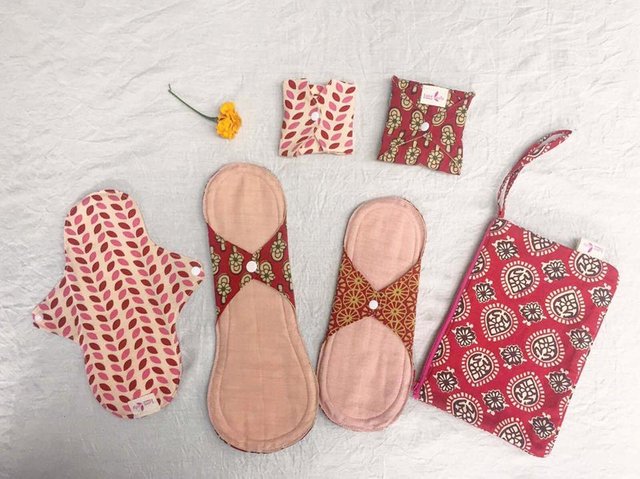More than environmental friendly! Cloth sanitary napkin is a key to female empowerment! 不只是環保!推廣布衛生棉實踐女性充權
The list of BBC 100 Women has been announced recently. Lin Nien-Tzu, coming from Taiwan, is one of the Asian women on the list. She is a founder of Dharti Mata Sustainable Workshop, which aims to provide local women clean and affordable cloth sanitary napkins. Local women are empowered by working in the workshop.
剛獲BBC選為「2017年全球百大女性」的台灣女生林念慈,因2013年遠赴尼泊爾成立社企「棉樂悅事」,打破當地禁忌話題,教導當地婦女生產環保布衛生棉、並鼓勵她們分享月經教育,過程中這群婦女性越發有自信,實踐女性充權。
Though being cursed during period禁忌話題 自以為是受詛咒
"When I first came to Nepal in 2009, I found out that the people who spoke to me were all men, such as school principals, social workers and teachers ... Then I really wanted to know what the women in the villages were thinking about. Then I found that their menstrual education was not enough and some girls even felt that they had been cursed or had no suitable menstrual supplies. "
「這個創業的初心的是當我2009年來到尼泊爾,我發現跟我講話的人都是男人,男的校長、社工、老師…然後我就很希望知道村子裡面的女人到底在想什麼,一問之下就發現原來她們的經期教育非常不足,甚至有些女生覺得自己受了詛咒,或者是沒有適合的月經用品。」
At the beginning of 2010, Lin Nien-Tzu talked with the women in the local communities and share their menstrual experiences. The women started to learn more their bodies. "Once we had to discuss the topic seriously, they couldn’t stop and kept asking me questions!" She laughed.
在2010開始,林念慈就跟當地社區婦女一起來討論大家的月事經驗。透過對話,她們開始去瞭解自己的身體,還有別人身體的故事。「當我們要跟她認真聊的時候,話題就打開了,她們就霹靂啪啦一直講,一直發問問題,我都不能招架呢!」林念慈笑說。
Colourful cloth sanitary napkins make changes打破傳統 彩色的布衛生棉
Later, Lin Nien-Tzu taught the women to hand-make cloth sanitary napkins. One of the members shared that, "This is not a new thing, but a whole new idea." The reason is that before we use disposable sanitary napkins, girls were using rags to make the sanitary napkins. But nowadays cloth sanitary napkins become advanced version, with wings and buttons, etc.
後來,林念慈便教她們手工縫製布衛生棉,當做完之後,其中有一個成員分享說:「This is not a new thing, but a whole new idea」原因是在沒有即棄衛生棉時代,女生都是用破布來縫製。現在的布衛生棉變成進階版,還有翅膀和扣子。
The women who had been involved in the workshops wanted to share with many people and asked for a purchase there so that Lin Nien-Tzu started her business. Before establishment, she interviewed more than 100 women for market research. "I happened to meet a woman and asked her some questions. Then I realized that their favorite cotton napkins were pink, red and orange ... the color they hate most is white!"
曾參與縫製的婦女想分享給很多人,便爭相來詢問那兒可購買,林念慈便起了創業的念頭。創立工房之前,她訪問了100多位的婦女作市場調查。「我剛好遇到個在放牛的婦女,我就開始問她一些問題,才發現她們最喜歡的布衛生棉顏色是桃紅色、紅色、橘色…反而最討厭的顏色是白色。」
Lin Nien-Tzu was astonished by this conclusio because she always felt that the sanitary napkins should be white. "They said the color of white looked sad and was not easy to be cleaned. Then I agreed the selection of red was very clever." So, she founded Dharti Mata Sustainable Workshop in 2013.
這個結論對林念慈來說卻是十分驚訝,因為她覺得自從出生以來看過的衛生棉,全部都是白色。「她們說白色看起來很哀傷,顏色也不好洗了。然後,我就覺得選用紅色好聰明了。」於是,在2013年她們成立了「棉樂悅事」。

Female Empowerment: From producer to educator 女性充權 由生產者變成教育者
There are 7 employees in Dharti Mata Sustainable Workshop. The first 2 employees changed from producers to educators. " I started to step back. I shared leadership skills and they came out to inspire their peers."
「棉樂悅事」現在有7位員工。最早的時期只有兩位員工,後來生產者也加入工作坊,變成教育者。「他們的尼泊爾文當然是非常好,我覺得我的角色就慢慢的退到後面,那他們就影響姊妹們,那我可以跟她們分享一些帶領的方式。」
In addition, the women living in the mountains were in a very harsh environment. Dharti Mata Sustainable Workshop also cooperated with local NGOs to massive produce cloth sanitary napkins. They asked local inhabitants to weave cloths, connecting the cloth sanitary napkins with traditional culture.
此外,住在高山上的婦女環境非常嚴峻,當時「棉樂悅事」也與當地NGO合作,使用自然染料之餘,並由當地原住民提供織布,一次過製成一兩千片布衛生棉,並帶上山去給高山婦女做教育。「我們的布料是跟整個傳統產業做連接,這也讓傳統布藝不要流失掉。」林念慈說。織布的過程,這些織布工人一邊織、一邊唱歌,整個生產過程其實也是很美的一個迴圈。
Male participation is equally important布衛生棉無分性別 高山民族的男性同樣支持
Cloth sanitary napkin does not only involve women, but also men. During these five years, Lin Nien-Tzu received a lot of men's help.
別以為布衛生棉只是女性的事,原來男性的參與也很重要。這五年間,林念慈收到很多男性的幫助。
"In Nepal, we have to gain support from men when making any decisions. For example, the husband has to approve his wife to work for us. Therefore, I found that the men in Nepal were very gentle. They had no ideas about the menstruation. Some male farmers realized that we were selling cloth sanitary napkins and they were excited to buy gifts for their wives. I feel that it is a matter of both girls and boys being involved. There should be no gender difference. "
「在尼泊爾所多決策都要男人同意,包含他的太太可不可以來我們這邊工作,整個家族的男人都要批准。所以我在尼泊爾感受到高山民族,很多男性很溫柔,他們完全不知道女生來月經的時候發生什麼事,因為都是女生自己躲起來,有很多的傳統都是女女相傳,有些男性的農夫發現我們在賣布衛生棉,然後他們興奮地要買伴手禮送給老婆,我自己覺得在做這件事情是男生女生都要一起共同參與,不要有性別的劃分。 」
Public education starts with dialogues打開對話 教育一直推廣出去
Over the past five years, Dharti Mata Sustainable Workshop has done a wide range of activities, such as exhibitions.
這五年來,「棉樂悅事」也辦了非常多的活動,例如在2013至2014期間的布衛生棉創意展。
"We hung cloth sanitary napkin in the coffee shop and the people were all shocked. But it was a good choice for us to initial the dialogues. Not only is it environmentally friendly, but also it is educational and urges for positive discussions."
「我們把布衛生棉掛在咖啡廳,裡面的人看到就差點噴出來,大家都傻眼了。但是,這個方式開始了話題,後來也有其他活動。我們希望女性能重視經期,因為這是每個月的一個重生,是一個內在的迴圈,讓她們知道這件事情可以很環保,可以用很正向的方式來去探討和討論。」
Maybe, it seems difficult to change the world. But Lin Nien-Tzu does not think so. "I think a lot of changes have to be started from own home or the community."
或者,要改變世界好像是遙不可及,但林念慈卻不這樣認為。「我自己覺得很多的改變就是從自己的家、或是從社區開始了。」
你的支持,是我繼續寫作的動力!請upvote和follow @travel-addict!
**If you like my article, please upvote and follow @travel-addict **
Resteemed your article. This article was resteemed because you are part of the New Steemians project. You can learn more about it here: https://steemit.com/introduceyourself/@gaman/new-steemians-project-launch
👍👍👍
謝謝!
👍👍👍👍